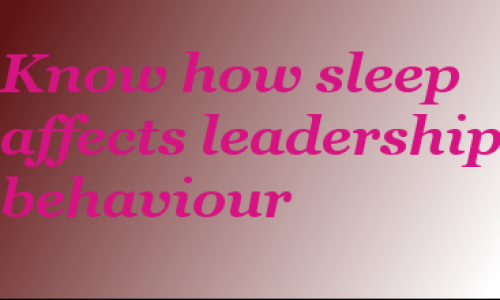While there are a lot of uncontrollable variables at play which make a working relationship hostile- sleep is one such variable which is well in control of all the stakeholders.
The average sleeping hours of 40 per cent of the population is less than seven hours, which is far from ideal.
In India, a study has said that 93 per cent people are sleep-deprived. Even if you reverse the numbers at the ones and tens places, it still stays a worrisome figure.
Overworking has taken away sleep off of people’s schedules, and the higher up the hierarchy you go, the more people you find overworking.
A body of academic research has been studying the causality between sleep and leadership behaviour. In this article, we will see how sleep deprivation affects leadership behaviour.
Three different research studies, all done by Christopher Barnes, Associate Professor of Management at the University of Washington’s Foster School of Business, in collaboration with other fellow researchers, examine the impact of sleep deprivation on particular leadership behaviours.
Here we will highlight what sleep deprivation does to leadership behaviours.
* A leader’s quality of sleep influences the leader’s self-control abusive supervision behaviour. Independent of the belief and style of leadership, there are many leaders who oscillate between being nice and abusive on different days.
Building on his initial research on sleep’s importance in restoring one’s ability to exert self-control, Barnes conducted another study which hypothesised that 'a lack of self-control on a given day would leave leaders more likely to engage in the negative behaviours associated with abusive supervision.'
The research concluded that the quality of sleep (not necessarily the quantity) influenced 'the leader’s self-control abusive supervision behaviour'; which was further responsible in determining the engagement levels of that leader’s subordinates.
* What distinguishes leaders from managers is their ability to use their charisma to inspire people.
Research has shown though, that sleep-deprivation robs leaders of their charisma. Sleep-deprived leaders cannot regulate their displays of positive emotion as effectively as the ones who sleep soundly.
The research had another interesting facet to it. It studied the perception capabilities of sleep-deprived followers and compared it against followers who sleep soundly.
The research found that the individuals who are sleep deprived find it hard to absorb positive emotions and thus, the ones who sleep effectively get inspired easily when compared.
* The latest paper, entitled 'Lack of sleep and the development of leader-follower relationships over time', published by Barnes, co-authored with Cristiano L Guarana, concludes that 'leader sleep deprivation undermined the follower’s perception of the quality of their working relationship'.
The research found that sleep-deprivation leads to the expression of hostility which translated into damaged working relationship between employees and their managers.
Sleep-deprived followers also developed a negative perception of the leader and the quality of their work relationship.
Leader's sleep deprivation undermined the follower’s perception of the quality of their working relationship
The eventual impact is on the productivity of the employee, and the ripple effect is felt by the team and ultimately the business.
Courtesy: www.peoplematters.in



